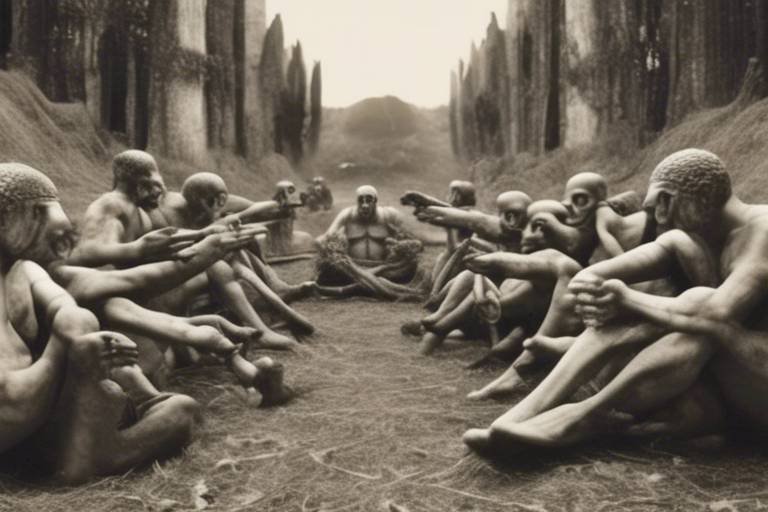The Evolution and Development of Metaphysics
Metaphysics, a term that often evokes a sense of mystery and abstraction, is a branch of philosophy that delves into the fundamental nature of reality. It poses questions that many of us ponder but few can articulate clearly. What is existence? What is the nature of objects and their properties? How do we understand the relationship between mind and matter? These inquiries have captivated thinkers for centuries, leading to an evolution of ideas that not only shaped philosophy but also influenced science, religion, and even our everyday lives.
To truly appreciate the journey of metaphysics, we must first recognize its historical context. It didn't emerge from a vacuum; rather, it evolved through the dialogues and debates of ancient philosophers. The roots of metaphysics can be traced back to the ancient Greeks, where figures like Plato and Aristotle laid the groundwork for what would become a rich tapestry of philosophical inquiry. Their ideas were not just academic musings; they were profound explorations of existence that continue to resonate today.
As we navigate through the ages, we find that metaphysics has undergone significant transformations. Each era has brought forth new ideas and challenges, reflecting the changing landscape of human thought. The Enlightenment, for instance, marked a pivotal moment when philosophers grappled with the implications of scientific discovery and sought to reconcile these advancements with metaphysical questions. This period saw the emergence of rationalism and empiricism, two schools of thought that would shape modern philosophical discourse and redefine the boundaries of metaphysical exploration.
In contemporary times, metaphysics remains a vibrant field of study. It engages with pressing issues such as consciousness, identity, and the very fabric of reality. The questions that once seemed abstract and esoteric are now at the forefront of scientific and philosophical inquiry. Today, metaphysicians are not only concerned with the nature of existence but also with how these concepts intersect with modern advancements in technology, psychology, and physics.
In summary, the evolution and development of metaphysics is a testament to humanity's enduring quest for understanding. It is a journey through time that reflects our deepest curiosities and the ever-changing nature of knowledge. As we continue to explore these profound questions, we find that metaphysics is not just an academic discipline; it is a vital part of our collective human experience.
- What is metaphysics? - Metaphysics is a branch of philosophy that studies the fundamental nature of reality, including concepts such as being, existence, and the universe.
- Who are the key figures in metaphysics? - Notable philosophers include Plato, Aristotle, René Descartes, Immanuel Kant, and Martin Heidegger, among others.
- Why is metaphysics important? - Metaphysics helps us understand the underlying principles of reality and existence, influencing various fields such as science, religion, and ethics.
- How has metaphysics changed over time? - Metaphysics has evolved through different philosophical movements, adapting to new scientific discoveries and cultural shifts.

Historical Origins of Metaphysics
Metaphysics, a branch of philosophy that delves into the fundamental nature of reality, has a rich and complex history that dates back to ancient times. Its origins can be traced to the philosophical traditions of ancient Greece, where some of the most influential thinkers laid the groundwork for metaphysical inquiry. These early philosophers sought to answer profound questions about existence, reality, and the nature of being, which continue to resonate in contemporary discussions.
One of the pivotal figures in this historical journey is Plato, who introduced the concept of the Theory of Forms. According to Plato, the material world is merely a shadow of a higher reality composed of abstract, non-material forms. This dualistic perspective not only influenced metaphysics but also shaped the way we think about knowledge and existence. Plato's idea suggests that the true essence of objects lies in their forms, rather than their physical manifestations. This notion led to a significant shift in philosophical thought, prompting subsequent thinkers to grapple with the implications of such a framework.
Following Plato, his student Aristotle emerged as another key figure in the evolution of metaphysics. Aristotle critiqued and expanded upon Plato's ideas, advocating for a more empirical approach to understanding the world. He introduced concepts such as substance and causality, which became foundational in the study of metaphysics. For Aristotle, the essence of an object is found in its substance—what it is fundamentally—rather than in some abstract form. This shift towards a more tangible understanding of reality marked a crucial development in metaphysical thought.
The interplay between these two philosophers highlights a significant tension in the origins of metaphysics: the struggle between abstract ideals and empirical realities. As we move forward in history, this tension would continue to shape the discourse, particularly during the Enlightenment, when thinkers began to reconcile scientific advancements with metaphysical questions. The evolution of metaphysics is not merely a historical account; it is a reflection of humanity's enduring quest to understand the very fabric of existence.
As we explore the historical origins of metaphysics, it is important to acknowledge the contributions of other philosophers who have enriched this field over the centuries. Below is a brief overview of some key figures and their contributions:
| Philosopher | Key Contribution |
|---|---|
| Plato | Theory of Forms |
| Aristotle | Concept of Substance and Causality |
| Descartes | Cogito, ergo sum (I think, therefore I am) |
| Kant | Transcendental Idealism |
| Heidegger | Being and Time |
In summary, the historical origins of metaphysics are deeply rooted in the philosophical explorations of ancient Greece. The foundational ideas put forth by Plato and Aristotle not only set the stage for future metaphysical inquiries but also continue to influence contemporary philosophical thought. As we delve deeper into the evolution of metaphysics, it becomes evident that this field remains a vital part of our understanding of reality and existence.

Key Philosophers in Metaphysics
The field of metaphysics has been profoundly shaped by the contributions of various philosophers throughout history. Each thinker has brought their unique perspective, challenging existing notions and expanding the boundaries of metaphysical inquiry. Among the most influential figures are René Descartes, Immanuel Kant, and Martin Heidegger. These philosophers not only explored the fundamental nature of reality but also questioned the very frameworks through which we understand existence itself.
Starting with René Descartes, often referred to as the father of modern philosophy, his famous dictum "Cogito, ergo sum" ("I think, therefore I am") encapsulates his belief in the primacy of thought as the foundation of existence. Descartes introduced a methodological skepticism that challenged the certainty of sensory experiences, positing that the mind is distinct from the body. This dualism created a significant shift in metaphysical discussions, raising questions about the relationship between the mind and the physical world, which continue to resonate in contemporary debates.
Moving on to Immanuel Kant, his revolutionary approach in the Critique of Pure Reason brought forth the idea that our understanding of reality is shaped by the structures of our own cognition. Kant argued that while we can know phenomena (the world as we experience it), the noumena (the world as it is in itself) remain inherently inaccessible to human understanding. This distinction created a new landscape for metaphysical inquiry, emphasizing the limits of human knowledge and the profound implications for our understanding of existence.
Martin Heidegger further transformed metaphysical thought by shifting focus from abstract entities to the nature of being itself. His seminal work, Being and Time, explores the concept of "Dasein," or "being-there," emphasizing the importance of individual existence and the contextual nature of reality. Heidegger's existential approach challenges traditional metaphysical categories, inviting us to consider how our understanding of being is intertwined with our lived experiences and the world around us.
To illustrate the contributions of these key philosophers, the following table summarizes their main ideas and the impact they have had on metaphysical thought:
| Philosopher | Main Contribution | Impact on Metaphysics |
|---|---|---|
| René Descartes | Mind-body dualism | Questioned the nature of reality and the certainty of knowledge |
| Immanuel Kant | Distinction between phenomena and noumena | Highlighted the limits of human understanding and knowledge |
| Martin Heidegger | Exploration of being and existence | Shifted focus to individual experience and the nature of being |
These philosophers not only laid the groundwork for metaphysical inquiry but also paved the way for future generations to explore the depths of existence, reality, and knowledge. Their ideas continue to provoke thought and inspire debate, demonstrating that the journey of metaphysics is far from over.
- What is metaphysics? Metaphysics is a branch of philosophy that explores the fundamental nature of reality, including concepts such as being, existence, and the universe.
- Why is metaphysics important? Metaphysics helps us understand the underlying principles of reality and existence, influencing various fields such as science, ethics, and theology.
- Who are some other key figures in metaphysics? Other notable philosophers include David Hume, Georg Wilhelm Friedrich Hegel, and Bertrand Russell, each contributing significantly to metaphysical thought.

Plato's Influence on Metaphysics
Plato stands as a towering figure in the realm of metaphysics, his ideas echoing through the corridors of philosophical thought even today. His theory of forms, often regarded as one of the most significant contributions to metaphysical discourse, introduces a captivating dualistic framework that separates the world of sensory experience from the realm of abstract entities. Imagine, if you will, a world where shadows dance on the walls of a cave—these shadows represent our everyday experiences, while the true forms, the essence of reality, exist outside the cave, in the light of understanding. This allegory not only illustrates Plato's perspective but also emphasizes the profound implications of his ideas on the nature of existence.
At the heart of Plato's metaphysical inquiry lies the concept of forms, which posits that these non-material entities represent the most accurate reality. According to Plato, everything in our physical world is merely a reflection or imitation of these perfect forms. For instance, consider the concept of beauty. While we may encounter beautiful things in our lives—a stunning sunset, a work of art, or a charming smile—Plato would argue that these are mere shadows of the true form of Beauty itself, which is unchanging and eternal. This notion challenges us to think deeply about the nature of reality and knowledge, prompting questions such as:
- What is the essence of the things we perceive?
- Are our experiences merely fleeting reflections of a greater truth?
- How do we access the realm of forms to gain true knowledge?
Plato's influence extends beyond just the theory of forms; it has sparked countless debates and discussions throughout history. His ideas laid the groundwork for metaphysical inquiry into the nature of being and knowledge, shaping the thoughts of subsequent philosophers. Yet, not all were in agreement with Plato's vision. For instance, Aristotle, one of his most famous students, critiqued the theory, arguing that it was too detached from empirical reality. Aristotle's insistence on grounding philosophical inquiry in the observable world marked a significant shift in metaphysical thought, leading to a more nuanced understanding of existence that would dominate philosophical discussions for centuries.
In summary, Plato's contribution to metaphysics is monumental. His theory of forms not only provides a lens through which we can explore the nature of reality but also invites us to question the very foundations of our understanding. As we delve deeper into metaphysical discussions, we find ourselves continually grappling with the implications of Plato's ideas, reminding us that the pursuit of knowledge is as much about the questions we ask as it is about the answers we seek.

Forms and Their Implications
The concept of forms, as introduced by Plato, is not just a philosophical notion; it represents a profound shift in how we perceive reality. Plato proposed that beyond our tangible world lies a realm of abstract entities, known as forms or ideas, which embody the true essence of all things. Imagine, for a moment, that everything we see around us—trees, cars, even emotions—has a perfect version in this abstract realm. This perspective challenges our everyday understanding of existence, suggesting that what we perceive is merely a shadow of a more authentic reality.
One of the most significant implications of Plato's theory is its impact on the nature of knowledge. If forms represent the ultimate truth, then knowledge becomes a process of recollection—an act of remembering the forms we once knew before our souls entered the physical world. This idea posits that learning is not about acquiring new information but rather about rediscovering the truths that already exist in the realm of forms. Thus, education transforms into a journey of enlightenment, where the goal is to ascend from the world of appearances to the world of reality.
Moreover, the implications of forms extend into various fields, including ethics, aesthetics, and metaphysics itself. For instance, in ethics, the form of the "Good" serves as the ultimate standard against which all moral actions are measured. This suggests that ethical dilemmas are not merely subjective opinions but can be evaluated against an objective reality. Similarly, in aesthetics, the form of beauty provides a benchmark for artistic expression, implying that true art must strive to reflect this ideal.
However, the theory of forms does not come without its critiques. Philosophers like Aristotle argued that Plato's dualistic framework was overly abstract and disconnected from the empirical world. Aristotle believed that understanding reality requires us to engage directly with the physical entities around us, rather than seeking some ethereal form. This critique paved the way for a more grounded approach to metaphysics, emphasizing that our experiences and observations are crucial to understanding existence.
In conclusion, while Plato's theory of forms has sparked extensive debate and critique, its implications are undeniably profound. It challenges us to think deeply about the nature of reality, knowledge, and existence itself. The tension between the ideal forms and the empirical world continues to influence philosophical discourse, inviting us to explore the intricate relationship between what is seen and what is believed to be true.
- What are Plato's forms? Plato's forms are abstract entities that represent the perfect essence of all things, existing in a realm beyond our physical world.
- How do forms relate to knowledge? According to Plato, knowledge is a process of recollection, where learning is about rediscovering the truths of the forms.
- What is the critique of Plato's theory? Aristotle critiqued Plato's theory by advocating for a more empirical approach to understanding reality, emphasizing the importance of direct observation.
- Why are forms significant in ethics and aesthetics? Forms provide objective standards for evaluating moral actions and artistic expressions, suggesting that true goodness and beauty can be measured against these ideals.

Critiques of Plato's Theory
While Plato's theory of forms has undeniably shaped the course of metaphysical thought, it has also faced significant criticism from various philosophers, most notably his student, Aristotle. Aristotle challenged the notion of abstract forms existing independently of the material world, arguing that such a dualistic framework complicates our understanding of reality. He believed that forms cannot exist apart from the objects they represent, which led him to propose a more empirical approach to metaphysics.
One of the core critiques revolves around the idea of universals. Plato posited that forms are the true essence of things, while the physical world merely reflects these higher realities. Aristotle countered this by suggesting that universals only exist within particular objects; for him, the essence of a thing is found in its tangible characteristics, not in some abstract realm. This perspective shifted metaphysical inquiry towards a more grounded understanding of existence, emphasizing the importance of observable reality.
Another significant critique came from the empiricists, who argued that knowledge arises from sensory experience rather than abstract reasoning. Thinkers like David Hume contended that Plato's reliance on rationalism neglects the role of empirical evidence in shaping our understanding of the world. Hume famously questioned the existence of causality and the certainty of knowledge derived from abstract concepts, suggesting that human experience is inherently limited and subjective.
Moreover, some philosophers have pointed out that Plato's theory leads to an ontological gap between the world of forms and the physical world. This division raises questions about how we can know these forms if they are entirely separate from our sensory experiences. This has led to further debates about the nature of knowledge itself: if knowledge of the forms is possible, how can it be accessed? Critics argue that this gap creates a disconnect that makes Plato's theory less applicable in practical terms.
In summary, while Plato's theory of forms has profoundly influenced the development of metaphysical thought, it has also prompted crucial discussions and critiques that have shaped the field. The transition from a dualistic to a more empirical approach, as advocated by Aristotle and later empiricists, reflects a significant evolution in how philosophers understand the relationship between reality and knowledge. This ongoing dialogue continues to enrich metaphysical inquiry, demonstrating that questioning foundational theories often leads to deeper insights.
- What is Plato's theory of forms? Plato's theory of forms suggests that non-material abstract forms represent the most accurate reality, distinct from the physical world.
- Why did Aristotle critique Plato's theory? Aristotle critiqued Plato's theory because he believed that forms cannot exist independently from the objects they represent, advocating for a more empirical understanding of reality.
- How did empiricism challenge metaphysical thought? Empiricism challenged metaphysical thought by emphasizing that knowledge is derived from sensory experience rather than abstract reasoning.
- What is the significance of the critiques of Plato's theory? The critiques of Plato's theory have led to significant shifts in metaphysical thought, encouraging a more grounded and empirical approach to understanding existence and reality.

Aristotle's Contributions to Metaphysics
Aristotle, often regarded as one of the greatest philosophers of all time, made profound contributions to the field of metaphysics that still resonate today. His approach was markedly different from that of his mentor, Plato. While Plato focused on abstract forms, Aristotle grounded his philosophy in the tangible world, emphasizing the importance of substance and causality. This shift from the abstract to the concrete marked a significant turning point in metaphysical thought.
One of Aristotle's key concepts is that of substance, which he defined as what something is fundamentally. He argued that every substance is a combination of matter and form. Matter refers to the physical stuff that makes up an object, while form refers to the essence or what makes an object what it is. For instance, consider a wooden table: the wood is the matter, and the design or purpose of the table is its form. This duality allowed Aristotle to address questions about existence in a way that was more aligned with observable reality.
Moreover, Aristotle introduced the idea of causality, which is crucial for understanding change and existence. He proposed that everything in the universe has a cause, and he categorized these causes into four types:
- Material Cause: What something is made of.
- Formal Cause: The form or essence of a thing.
- Efficient Cause: The agent or force that brings something into being.
- Final Cause: The purpose or goal of an object.
This framework of causality not only provided a way to understand the nature of change but also laid the groundwork for future metaphysical inquiries. Aristotle's emphasis on empirical observation and logical reasoning encouraged a more scientific approach to metaphysics, which was revolutionary at the time.
Another significant contribution was Aristotle's concept of potentiality and actuality. He argued that everything in the universe has the potential to change and develop into something else. For example, an acorn has the potential to become an oak tree. This distinction between potentiality (the inherent capacity for change) and actuality (the realization of that potential) has had a lasting impact on metaphysical discussions about existence and reality.
In summary, Aristotle's contributions to metaphysics were foundational. By introducing the concepts of substance, causality, and potentiality versus actuality, he provided a framework that allowed for a deeper understanding of reality. His work not only challenged existing philosophical paradigms but also paved the way for future thinkers to explore the complexities of existence in more nuanced ways.
- What is metaphysics? Metaphysics is a branch of philosophy that explores the fundamental nature of reality, including concepts such as being, existence, and the universe.
- How did Aristotle differ from Plato in his metaphysical views? Aristotle focused on the tangible world and empirical observation, while Plato emphasized abstract forms and ideals.
- What is the significance of substance in Aristotle's metaphysics? Substance is crucial for understanding what things are at their core, combining both matter and form.
- What are the four causes introduced by Aristotle? The four causes are material, formal, efficient, and final causes, which explain why things exist and change.

The Rise of Modern Metaphysics
As we journey into the modern era, the landscape of metaphysics begins to shift dramatically, particularly during the Enlightenment period. This was a time when **thinkers** were not just gazing at the stars or pondering the nature of existence in isolation; they were actively engaging with the **scientific advancements** of their day. The Enlightenment served as a catalyst for a profound transformation in metaphysical thought, as philosophers sought to bridge the gap between empirical science and the abstract questions of reality. It was a period characterized by a fervent desire to understand the universe through reason and observation, leading to new frameworks that would challenge and redefine the very essence of metaphysics.
One of the most significant developments during this time was the emergence of two dominant schools of thought: **rationalism** and **empiricism**. These schools represented fundamentally different approaches to knowledge and existence. Rationalists, like **René Descartes**, argued that reason alone could lead us to truths about the world, emphasizing the importance of innate ideas and deductive reasoning. On the other hand, empiricists, such as **John Locke** and **David Hume**, contended that all knowledge originates from sensory experience, advocating for a more observational approach to understanding reality.
This clash between rationalism and empiricism ignited a series of debates that would resonate throughout the realms of metaphysics and beyond. For instance, while rationalists believed in the existence of certain truths that could be deduced logically, empiricists challenged this notion by pointing out that our perceptions could be deceptive. This tension not only enriched metaphysical discourse but also paved the way for **new philosophical inquiries** that continue to be relevant today.
As these discussions unfolded, philosophers began to explore the implications of their theories on concepts such as **identity**, **existence**, and **the nature of reality** itself. The question of whether reality is constructed by our perceptions or exists independently of them became a central focus. This inquiry reflects a broader trend in modern metaphysics: the desire to understand how human thought interacts with the world around us. In many ways, this exploration can be likened to peeling back the layers of an onion—each layer revealing deeper complexities and nuances about existence.
Moreover, the rise of modern metaphysics also saw the introduction of **new terminologies** and frameworks that would eventually influence contemporary philosophical thought. For example, the concept of **substance** became a focal point, prompting discussions about what it means to exist and what constitutes the fundamental building blocks of reality. This led to a variety of interpretations and theories that would challenge traditional views, showcasing the dynamic nature of metaphysical inquiry.
In summary, the rise of modern metaphysics was not merely a reaction to the scientific advancements of the time; it was a **revolutionary shift** in how philosophers approached the questions of existence and knowledge. The interplay between rationalism and empiricism opened up a wealth of new ideas and debates that would shape the future of metaphysical thought. As we continue to grapple with these age-old questions, it becomes clear that metaphysics remains a vital area of inquiry, one that encourages us to ponder our place in the universe and the very nature of reality itself.
- What is metaphysics? Metaphysics is a branch of philosophy that explores the fundamental nature of reality, including concepts such as being, existence, and the universe.
- How did modern metaphysics differ from ancient metaphysics? Modern metaphysics began to incorporate scientific advancements and empirical observations, contrasting with ancient metaphysics, which was more abstract and speculative.
- Who are some key figures in modern metaphysics? Important figures include René Descartes, John Locke, and David Hume, each of whom contributed significantly to the development of metaphysical thought.
- Why is metaphysics relevant today? Metaphysics continues to engage with contemporary issues such as consciousness, identity, and the nature of reality, making it a vital area of philosophical inquiry.

Rationalism vs. Empiricism
The clash between rationalism and empiricism during the modern era was not just a philosophical debate; it was a battle for the very soul of knowledge itself. Imagine two rival factions in a grand philosophical arena, each armed with their own weapons of thought. On one side, we have the rationalists, who believe that reason and innate ideas are the primary sources of knowledge. Thinkers like René Descartes and Baruch Spinoza championed the idea that certain truths are self-evident and can be discovered through logical deduction alone. They argued that our understanding of the world is shaped more by our reasoning abilities than by our sensory experiences.
On the opposing side, the empiricists, represented by philosophers such as John Locke and David Hume, held a contrasting view. They posited that knowledge originates from sensory experience and that our understanding of reality is built upon what we can observe and measure. For them, the world is a vast tapestry woven from the threads of experience, and without these threads, we would be left with nothing but empty speculation. This fundamental disagreement raised important questions: Can we truly know anything beyond our immediate experiences? Is reason enough to grasp the complexities of existence?
As these two schools of thought vied for dominance, they inevitably influenced the course of metaphysical inquiry. The rationalists sought to establish a framework for understanding reality that relied on a priori knowledge—knowledge that exists independently of experience. They believed that through careful reasoning, one could arrive at truths about the universe that are universally valid. In contrast, the empiricists emphasized the importance of observation and experimentation, advocating for a more grounded approach to knowledge that could adapt to new findings and experiences.
This philosophical duel led to significant advancements in metaphysical thought. For instance, the rationalist perspective contributed to the development of concepts like substance dualism, which posits that the mind and body are distinct entities. Meanwhile, empiricism paved the way for a more scientific approach to metaphysics, encouraging philosophers to consider the implications of scientific discoveries on our understanding of reality.
In a nutshell, the tension between rationalism and empiricism has not only shaped the landscape of metaphysics but has also left an indelible mark on contemporary philosophy. As we grapple with modern issues such as consciousness and identity, the questions raised by these two schools of thought continue to resonate. Are we merely products of our experiences, or do we possess an innate understanding of the world that transcends sensory input? The dialogue between these two perspectives remains a vital part of philosophical inquiry, urging us to explore the depths of knowledge and existence.
- What is rationalism? Rationalism is the philosophical view that reason and innate ideas are the primary sources of knowledge, emphasizing the role of logic in understanding reality.
- What is empiricism? Empiricism is the belief that knowledge comes primarily from sensory experience, advocating that our understanding of the world is built upon observation and experimentation.
- Who are some key figures in rationalism? Key figures include René Descartes, Baruch Spinoza, and Gottfried Wilhelm Leibniz, who all contributed to the development of rationalist thought.
- Who are some key figures in empiricism? Important empiricists include John Locke, George Berkeley, and David Hume, who emphasized the significance of sensory experience in acquiring knowledge.
- How do rationalism and empiricism influence modern philosophy? The debate between rationalism and empiricism continues to shape contemporary discussions around knowledge, reality, and the nature of existence, influencing various fields including science, ethics, and metaphysics.

Metaphysics in Contemporary Philosophy
In today's fast-paced world, where science and technology reign supreme, you might wonder: does metaphysics still hold water? The answer is a resounding yes! Metaphysics has not only survived but has also adapted and evolved, addressing some of the most pressing questions of our time. Think about it: as we dive deeper into the mysteries of consciousness, identity, and the very fabric of reality, metaphysics offers a framework to explore these profound issues.
One of the most exciting developments in contemporary metaphysics is its engagement with the concept of consciousness. Philosophers are grappling with questions like: What is consciousness? Is it merely a byproduct of brain activity, or does it represent something more fundamental? This inquiry isn't just philosophical; it intersects with neuroscience, psychology, and even artificial intelligence. The debates surrounding these topics are reminiscent of ancient philosophical discussions, but they're now infused with modern scientific insights.
Moreover, the notion of identity has taken on new dimensions in the contemporary landscape. With advancements in technology, particularly in areas like genetic engineering and artificial intelligence, the question of what constitutes personal identity is more complex than ever. Are we defined by our memories, our physical bodies, or something else entirely? Philosophers today are exploring these questions through various lenses, including metaphysical discussions on the self, personal continuity, and the implications of emerging technologies.
Another fascinating area of exploration is the nature of reality itself. As quantum physics challenges our classical understanding of the universe, metaphysicians are stepping in to analyze the implications of these scientific theories. For instance, concepts like multiverse theory and the nature of time are being scrutinized under the metaphysical microscope. This intersection of science and philosophy not only enriches our understanding but also sparks debates that resonate with both philosophers and scientists alike.
To illustrate the ongoing relevance of metaphysics in contemporary philosophy, consider the following table that highlights key areas of inquiry:
| Area of Inquiry | Key Questions | Philosophers Involved |
|---|---|---|
| Consciousness | What is consciousness? Is it physical or non-physical? | David Chalmers, Daniel Dennett |
| Identity | What defines personal identity? How do we remain the same over time? | John Locke, Derek Parfit |
| Nature of Reality | What is the true nature of reality? Are there multiple realities? | David Lewis, Max Tegmark |
In conclusion, metaphysics is far from obsolete; it is a vibrant field that continues to provoke thought and inspire dialogue. By addressing contemporary issues, metaphysics not only enriches our understanding of the world but also challenges us to rethink our assumptions about existence. So, the next time you ponder the mysteries of consciousness or the essence of reality, remember that metaphysics is there, ready to explore the depths of these fascinating questions.
- What is metaphysics?
Metaphysics is a branch of philosophy that explores the fundamental nature of reality, including concepts such as being, existence, and the universe. - Why is metaphysics important?
Metaphysics helps us understand the underlying principles of reality, guiding our thoughts on existence, consciousness, and identity. - How does metaphysics relate to science?
While science focuses on empirical evidence and the physical world, metaphysics addresses questions that often lie beyond scientific inquiry, such as the nature of existence and the concept of reality. - Can metaphysics change our understanding of the world?
Absolutely! Metaphysical inquiries can lead to shifts in perspective, influencing how we interpret scientific findings and our place in the universe.
Frequently Asked Questions
- What is metaphysics?
Metaphysics is a branch of philosophy that investigates the fundamental nature of reality, including concepts such as being, existence, and the universe. It seeks to answer profound questions about what is ultimately real and how things are related.
- Who are some key figures in the history of metaphysics?
Some of the most influential philosophers in metaphysics include Plato, who introduced the theory of forms; Aristotle, who focused on substance and causality; and later thinkers like Descartes, Kant, and Heidegger, each contributing unique perspectives to the field.
- How did Plato influence metaphysics?
Plato's theory of forms posited that non-material abstract forms are the most accurate reality, which significantly shaped metaphysical discussions about existence and knowledge. His dualistic framework encouraged later philosophers to explore the relationship between the material and the abstract.
- What were Aristotle's contributions to metaphysics?
Aristotle expanded on Plato's ideas by introducing concepts like substance and causality. He emphasized empirical observation and logical reasoning, which became foundational to both ancient and modern metaphysical thought.
- What was the impact of the Enlightenment on metaphysics?
The Enlightenment was a turning point for metaphysics, as philosophers sought to reconcile scientific discoveries with metaphysical inquiries. This era sparked debates between rationalism and empiricism, shaping the direction of metaphysical discourse.
- How is metaphysics relevant today?
Metaphysics remains relevant in contemporary philosophy as it tackles complex issues like consciousness, identity, and the nature of reality. Philosophers continue to engage with these topics, demonstrating that metaphysical questions are still vital in understanding our existence.



















